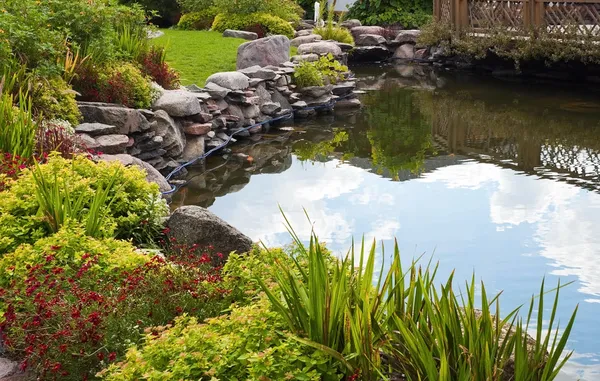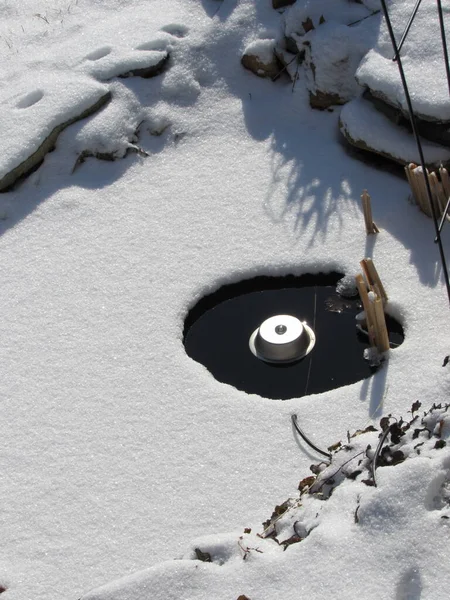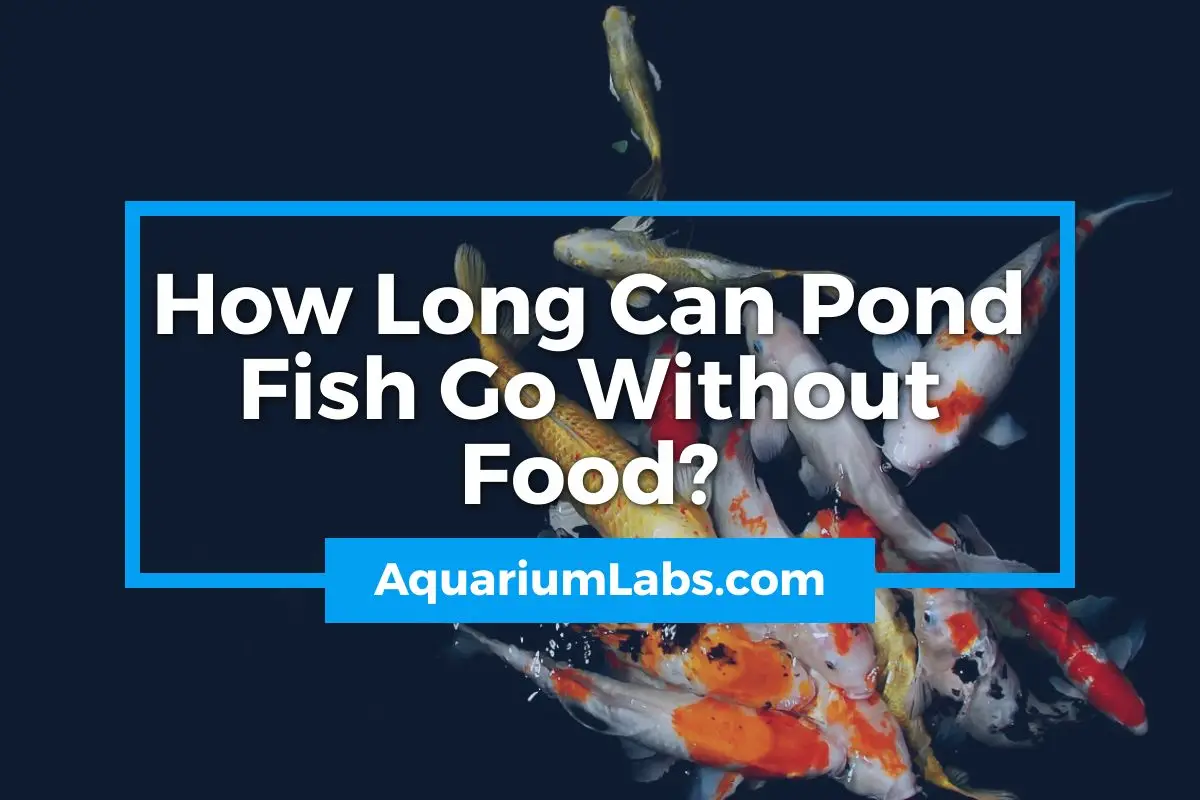Keeping fish in a pond is an art. Many hobbyists enjoy it because the art uses its natural environment.
But one important aspect of keeping pond fish is feeding. A pond owner going on a vacation may wonder, how long can pond fish go without food?
Here is a detailed piece that discusses the answer and many other important things you need to know about feeding pond fish.
Can Your Pond Fish Go Without Food?
Yes, your goldfish, koi, and any other great pond fish in your pond can go without food for a long time.
Although as part of a natural fasting habit, pond fish do not eat at some time of year when the water temperature drops too low. This is because the rate at which their bodies naturally convert food slows down.

Even in warm temperatures, pond fish can survive without you feeding them for up to two weeks. This is because pond fish are literally always eating.
They can survive on various natural edible options in the pond, ranging from insect larvae laid on the water surface to unlucky insects that settle on twigs and other surfaces that are very close to the fish. They also nibble at the aquatic as plants in the water and many other decaying matters.
But while they can go long without food, it would not be wise to let them go for too long without feeding them. So how long can your pond fish without food?
How Long Can Pond Fish Go Without Food?
To know precisely how long your pond fish can survive without feeding, you would have to take a few considerations into account. These factors include
- Fish Species and SizeIf you have smaller species mixed with large specimens of the same species or others in your pond, waiting too long before feeding them may lead to cannibalism. Remember that pond water fish are omnivores, and smaller fish can always become prey if food is scarce. If you rear more than one species of varying sizes, frequent feeding is an important step to preserving the lives of the smaller fish.
- The Water TemperaturePond fish survive without food for about three months during cold temperatures in December, January, and February. They can survive these winter months without feeding since their body metabolism reduces. You do not have to throw food in the pond at all during the fasting periods.
- The Age of the FishYounger fish and baby fish have not fully developed to the point where they can cope with long fasting periods like older and mature fish.So if you have a growing population of younger fish in your pond, it would be best to ensure that you feed your fish more frequently.
However, most species can survive without feeding for up to two weeks. Some may survive more than two weeks due to the naturally occurring elements in the fish pond. And others may hardly go that long. But two weeks is about a safe bet.
Be careful not to push your luck. Pond fish can survive without food for about two weeks or as long as nature permits in some temperatures.
Feeding Frequency
How often you feed your fish is another important aspect of keeping fish in ponds.
If you feed too often, you will end up with poor water quality as the leftover food will dissolve in the fish pond. When this happens, the burden on the beneficial bacteria that help to break down waste and keep the water clean will be too much for the beneficial bacteria. You will end up with poor water quality.
Also, note that fish metabolism slows down in cold water temperatures. These should logically affect how often you feed your fish. Below is a detailed guide on how often to feed your pond fish.
In Temperatures Below 50°F

It would be best to stop feeding pond fish at water temperature dips of 39°F and less. This is important, especially during winter, as they are just like bears hibernating since they are cold-blooded. Their metabolism slows down significantly in this temperature range, so it would be best to stop feeding them.
At water temperatures of about 40°F-50°F, feed pond fish once or twice a week. Follow this guide, especially if you rear goldfish or koi fish.
Whether for mature goldfish, baby fish, or any other pond fish at all, this guide will ensure that the water quality of your fish ponds does not deteriorate. Ensure to be alert as water temperature drops.
In Temperatures Above 50°F
Start feeding them once winter is over and the temperature warms up. But remember to mind the rules about the lower temperatures before your fish ponds reach 50°F.
In temperatures above 50°F, ensure to feed them, and feed them the good stuff only.
Feeding your fish about 5 times a week is ideal, depending on how old the fish are. Feed them some 2-4 times a week for mature fish and up to 5 times for smaller fish.
Ensuring that they are eating only the amount they need is important to prevent poor water quality.
Having them eat only as much as they can in two minutes is a great starting point.
If you notice that the algae growth in the pond is becoming too much, it would be best to reduce how much food you give them to eat.
What Type of Food Can You Feed Your Pond Fish?
What to feed is equally as important as how often to feed them. Fish survive without food for long because they eat algae and almost anything they find edible.
You want to imitate nature and feed them natural foods as much as possible. You can feed them live plants, plant matter, insects and insect larvae, and pretty much anything they will eat in their natural environment.
You can feed your fish blood worms, brine shrimps, insects, and insect larvae. You can also feed them greens like peas and squash. Although these greens are not like algae, they will supply some great nutrients and not constitute any digestive problems.
But you do not want them to eat dog food. Although they are omnivores, food containing chicken, beef, or gluten is not easily digestible for them.
Feeding Tips For Pond Fish (Commercial and Natural Food)
Ensure that they are eating more natural food. Commercial products tend to negatively impact the water quality when it dissolves. But worms, shrimps, and other small animals will hardly pollute the water as most are aquatic animals too.
Try to keep the vacation less than two weeks. This way, you can deal with whatever unexpected developments might be time-wasting and still come back home in time.
You can install a feeding station to keep the feed floating so that the quality of the water is not changed. You can also install a vacation feeder. This will ensure that your fish are not overfed and are fed at the appropriate time.
Feed fish low protein food during colder months and more protein during warmer months. This is in response to their response to temperature changes.
Fish ponds’ temperatures can be lowered to trick the fish into going without their own food. While this may not work for a water garden outdoor pond, it would be in an artificial water pool. You can remove the heater or dial it down. This will lower their body metabolism.
Also, if you want to keep them active during the cold winter months, you can use a heater for your indoor pool to raise the water temperature and, in effect, their metabolism.
Final Thoughts
Enough food is hardly a problem with keeping goldfish or any other pond fish. But it would not be wise to go on without feeding them for too long. More than two weeks may be too long.
Also, remember that December, January, and February are not feeding months as many ponds will experience colder temperatures. They will do fine without feeding until it is warm again.
And always remember to feed your fish only the good stuff.
Related Reading:

